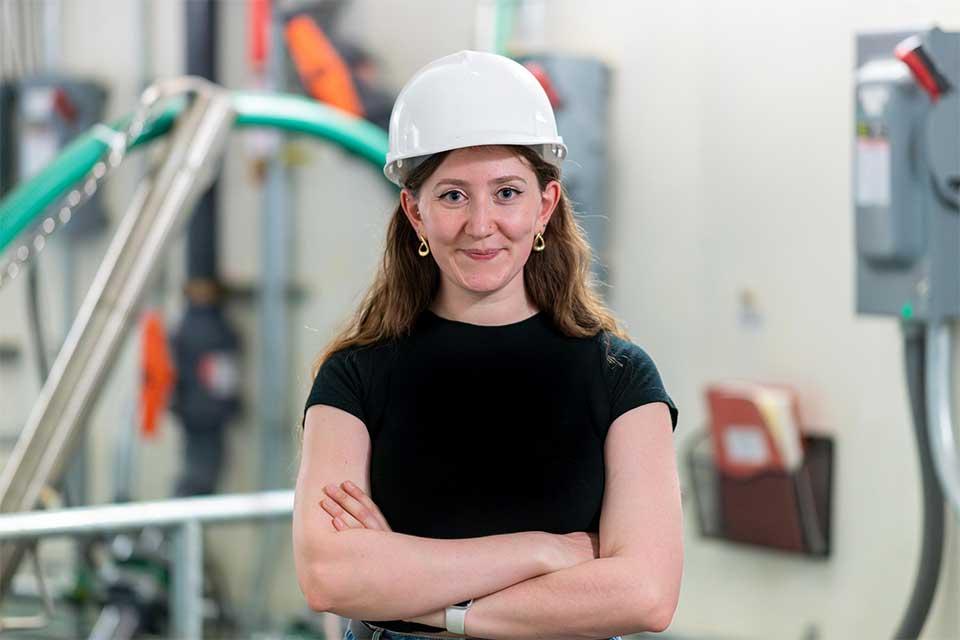We work among extraordinary people doing extraordinary things; get to know some of them by reading these quick-fire interviews.
Name: Abbey Barnard
Job title: Graduate student, Particle Physics
What are you currently working on?
I am a first-year Particle Physics DPhil student in the Accelerator Neutrino group, working on the Micro Booster Neutrino Experiment (MicroBooNE) at the Fermi National Accelerator Laboratory (Fermilab) near Chicago, Illinois. MicroBooNE is a bus-sized particle detector filled with liquid argon, designed to detect neutrinos: tiny, almost massless particles that barely interact with the world around them.
There are three ‘flavours’ of neutrino: electron, muon, and tau. Neutrinos can change flavour as they move through space, a phenomenon known as oscillation. New experiments, such as the Deep Underground Neutrino Experiment (DUNE) in the United States, are being built to study neutrino oscillation in greater detail than ever before. These experiments aim to answer fundamental questions, such as why there is more matter than antimatter in the universe. Like MicroBooNE, DUNE will also use liquid argon to detect neutrinos.
For DUNE to make precise measurements, it must have a good understanding of neutrino-argon interactions. This is where my research comes in. I am focused on enhancing our knowledge of electron neutrino interactions with argon using data from MicroBooNE, which is crucial for DUNE's success in answering these important questions.
Describe a typical day
One of the things I enjoy most about being a graduate student is that every day is different! My ‘typical’ day almost always starts with coffee (in true graduate student fashion), either at home in the Keble graduate centre or my office just across the road. After that, I quickly check on the progress of my production campaigns. In addition to my analysis work, I contribute to MicroBooNE through a 'service task' that supports various other aspects of the experiment. Specifically, I work as a production manager, creating data samples that other scientists in the experiment use for their research. Once this is done, I continue where I left off the previous day on my research project.
After enjoying a Co-op meal deal for lunch, I join various online MicroBooNE meetings, including general meetings, service work discussions, and cross-section working group sessions. These meetings are essential for staying up to date on the Collaboration's progress and learning about what other collaborators are working on. Within the Physics Department, we have weekly particle physics seminars covering all areas of the field, along with an Accelerator Neutrino group meeting. After nattering with the other graduate students, my supervisor, and the postdocs in my group, I head home to spend my evening reading, at the gym, or with my college friends in our Middle Common Room.
If you had an entire day at your disposal (not at work/studying), what would be your ideal way to spend it?
My ideal day would begin with a lie-in! After that, I would like to spend a full day in London, a city I am eager to explore further now that I live nearby. Since visiting America for the first time recently, I have been missing some of the staples there. I would love to grab a Dunkin’ coffee and wander around one of London’s many parks, followed by some food from Camden Market.
What is your favourite place in Oxford?
My favourite place in Oxford is my college, Keble! It feels very homely, and its red-brick architecture reminds me of Manchester, where I grew up. On sunny days, it is the perfect spot to have a coffee and take a break from work (especially with friends).
Plan B: what would you be if you weren’t doing the job you are currently doing?
If I weren’t a graduate student, I would love to be a pilot – quite a different path from what I am doing now! Funnily enough, I used to be quite frightened of flying when I was younger, but I grew to love it as I got older. Fortunately, particle physics is extremely international, so I get to travel a lot now, even if I am not in the pilot’s seat!

